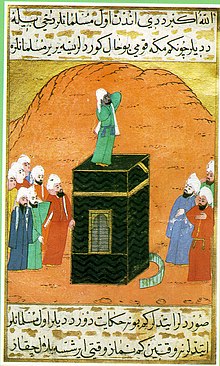Bilal ibn Rabah
Bilāl ibn Rabāh al-Habashī (Arabic بلال بن رباح الحبشي, DMG Bilāl b. Rabāḥ al-Ḥabašī) was one of the companions (sahāba) of the Prophet Muhammad, the founder of Islam. He was probably from East Africa and was a slave of Umayya ibn Chalaf. He was one of the strangers of non-Arab descent (muwallad) born in Mecca.
He is said to have been one of the first men to profess Islam; according to other accounts, he was among the first seven persons to join Muhammad in Mecca. During the Meccan period of prophecy, Muslims, especially those who lived in Mecca as patrons or slaves of the Quraish, were persecuted by their polytheistic patrons. Eventually Bilal was ransomed from slavery by Abū Bakr after enduring unbearable torment. He became a close confidant and servant of the Prophet.
After Muhammad's emigration (hijra) to Medina, he became the prayer caller (muezzin), Adhan of the Medinan community, not least because of his beautiful voice. At the Battle of Badr he killed his rival and former patron Umayya ibn Chalaf and his son. He also participated in other battles - Uhud, Battle of the Trench.
At the conquest of Mecca, Muhammad instructed him to call for prayer from the roof of the Kaaba; however, some could not hide their displeasure that a black servant, of all people, called Muslims to prayer on this historical occasion. This is said to have been the occasion for the revelation of the following Qur'anic verse, according to accounts of the Prophet's biography (Sira) and Qur'anic exegesis (tafsir):
"You people! We have created you (by making you) descended from a male and a female, and We have made you into associations and tribes, that you may know one another (on the basis of genealogical relations). The most noble with God is he of you who is most pious ..."
- Koran: Sura 49, Verse 13
After the Prophet's death, he continued to act as a prayer caller under Abu Bakr, but gave up this office in ʿUmar b. al-Chattāb with reference to the following Prophet's saying:
"Your most excellent deed is jihad in the way of God."
With this argument, Bilal moved to Syria and is reported to have said, "I will fight to my death."
According to contradictory reports, he died between 638 and 642 either in Damascus or Aleppo or in Darāyā, near Damascus. Numerous anecdotes and legendary accounts arose around his figure; Ibn ʿAsākir devotes a fifty-page biography to him in his city history of Damascus.
To this day, many male Muslims in Africa are named Bilal after him.

Turkish miniature painting: Bilal al-Habaschi
See also
- Bilal Mosque
- Bilal Muslim Mission
Search within the encyclopedia